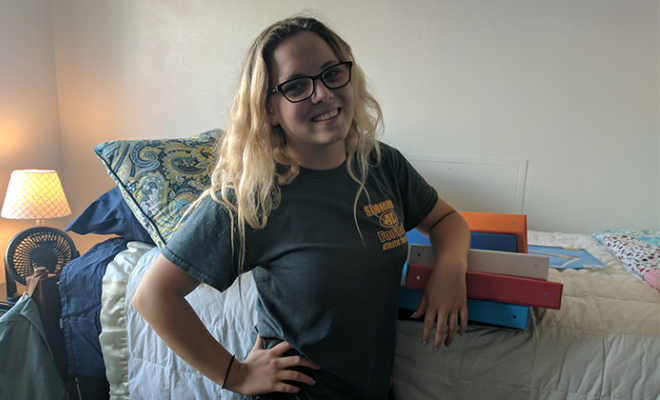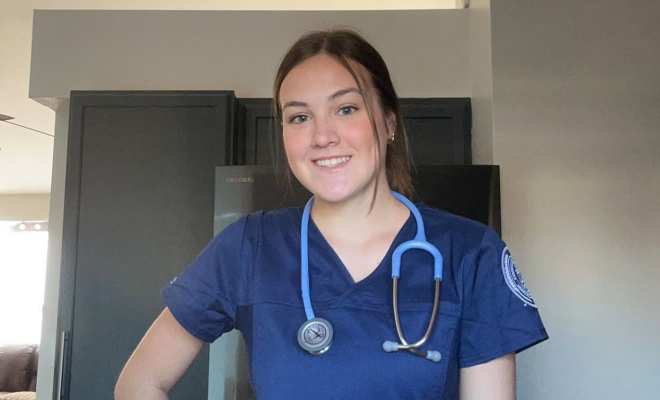I’ve found that one of the greatest misconceptions about living with a chronic disease is that it is purely a physical battle. Every difficulty — physical or otherwise — manifests emotionally. For many people with CF, we hold a certain pragmatism in how we respond to setbacks. With the precariousness of cystic fibrosis, disappointments and intense periods of highs and lows are unavoidable.
Ironically enough, I had never struggled with my identity with cystic fibrosis until after I began taking Trikafta, which I started in December 2019 when I was 15 years old. I couldn’t stop myself from falling down media rabbit holes, even when I knew this would only exacerbate my fears about what my future with CF would look like. Each time I sought good news, I would find a story about someone with CF doing something that would otherwise be considered commonplace for those who don’t have CF — such as going into the nursing profession or becoming a mother — and I would invariably end up overcome by frustration and jealousy. These milestones of life seemed so routine and ordinary that if I were to tell someone that these were my biggest dreams, they would've undoubtedly told me to dream bigger.
I felt that I didn’t have room to dream bigger. Rather, if I did, I would ultimately end up disappointed with the result.
After being on Trikafta, everything I had been told when I was younger had been extended, and the range of what I could do with my future had markedly improved. I had truly begun to realize how fortunate my situation was and how the release of the medication had come at a time of my life that is typically a turning point in the progression of my disease. In almost every sense, I was incredibly fortunate to be in such an early stage of my CF progression when Trikafta became available. I had spent much of my time numb to the notion that I may not be able to experience life to its fullest, whatever that may be, and since being given that chance, I have profound gratitude.
And yet, amidst my physical health and newfound passions and opportunities, I still felt like something wasn’t as it should be. When complications arose, it was almost refreshing — because it was familiar. I felt an unprecedented surge of guilt for not experiencing the same level of complications with my CF that I had throughout my childhood. I felt like I had dodged a life with a chronic disease that everyone with CF before me had been forced to endure.
Three years after starting Trikafta, and during my first semester of college, I began to experience a myriad of abnormalities in my health, eventually leading me to be diagnosed with cystic fibrosis-related diabetes (CFRD), which had previously gone undetected. Initially, I attended college nine hours from home before transferring to the University of Virginia (UVA). I found the academic transition demanding, which, in tandem with managing the unfamiliarity of CFRD, overwhelmed me.
Taking responsibility for my health was not a foreign concept to me. I had always managed my medications and routines without much anxiety, so the independence that came with studying away from home was not the root of my struggle. Instead, I felt consumed by isolation — my friends and peers seemed to be coasting by while I was struggling to keep my head above water. At times, this evoked unwanted jealousy. I felt like my effort to keep my grades where I wanted them was disproportionate compared to my peers. I constantly felt that I had to advocate for my health in a way I never had before, all while navigating the rigor and novelty of college. Ultimately, these circumstances led me to transfer to UVA, where I am now studying nursing.
My first semester at UVA was marked by a sense of loneliness that I was unprepared for as a mid-year transfer. This feeling of isolation led me to discover writing as a source of catharsis — a way to impose my sense of isolation onto characters, albeit with a different source than CF.
As I’ve emerged from adolescence into young adulthood, I’ve realized that the occasional doubt, jealousy, and guilt that come from navigating a new form of life with CF are not weaknesses or faults. Instead, they’re testaments to the ability to adapt to change and are signs that you can navigate CF as it changes with you.
Ultimately, in growing and maturing with the disease, I’ve found that my relationship with my CF is far more complex than I had initially believed. While it is undoubtedly the cause of many frustrations, setbacks, and disappointments, I am no longer able to antagonize the idea of my cystic fibrosis strictly. CF is not just something that exists superficially — though it is just one aspect of our lives that changes and demands us to change with it.
Interested in sharing your story? The CF Community Blog wants to hear from you.





